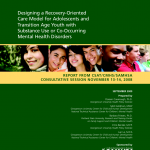Webinar: Increasing Family Voice in the Juvenile Justice System
By Susan Richardson, September 11 2014
Why is a family voice significant in the juvenile justice system? I’m addressing this question in a September 19 webinar, along with Sandra Spencer of the National Federation of Families for Children's Mental Health.
September 19 webinar, along with Sandra Spencer of the National Federation of Families for Children's Mental Health.
We’ll discuss why family voice is crucial to the success of and support of youth involved in the juvenile justice system. As an advocate for substance abuse and mental health treatment for teens, Reclaiming Futures helps families connect to the community support resources needed for adolescents to stay clean and sober, and become a productive member of society.
Here are three takeaways you’ll gain from attending this webinar:
- Understand and discuss why family and youth voice is critical
- How to incorporate family voice into practice in the juvenile justice system
- Learn how Reclaiming Futures sites have successfully integrated family voice
Details:
- What: Webinar—Increasing Family Voice in the Juvenile Justice System
- When: Friday, September 19, 3-4 p.m. EDT
- Presenters: Sandra Spencer, Executive Director, National Federation of Families for Children's Mental Health; Susan Richardson, National Executive Director, Reclaiming Futures;
- Register: Register here
- Cost: Free
- Contact: If you are unable to listen from your computer and need to call in, please email theinstitute@ssw.umaryland.edu


 Below you’ll find a selection of the latest grants, jobs, webinars and events posted to our Opportunity Board. Please share the
Below you’ll find a selection of the latest grants, jobs, webinars and events posted to our Opportunity Board. Please share the  A recent study conducted by Florida’s Office of Juvenile Justice and Delinquency Prevention and the University of Florida revealed that juvenile offenders in Florida have significantly higher rates of adverse childhood experiences (ACEs) than the population as a whole.
A recent study conducted by Florida’s Office of Juvenile Justice and Delinquency Prevention and the University of Florida revealed that juvenile offenders in Florida have significantly higher rates of adverse childhood experiences (ACEs) than the population as a whole. Juvenile Justice Reform
Juvenile Justice Reform “Nearly two-thirds of adolescents who have had a major depressive episode don't get treatment, according to the Substance Abuse and Mental Health Services Administration.”
“Nearly two-thirds of adolescents who have had a major depressive episode don't get treatment, according to the Substance Abuse and Mental Health Services Administration.”

 By 19,
By 19,  Moving toward the next step in determining reliable practices that reduce youth crime, the
Moving toward the next step in determining reliable practices that reduce youth crime, the 
